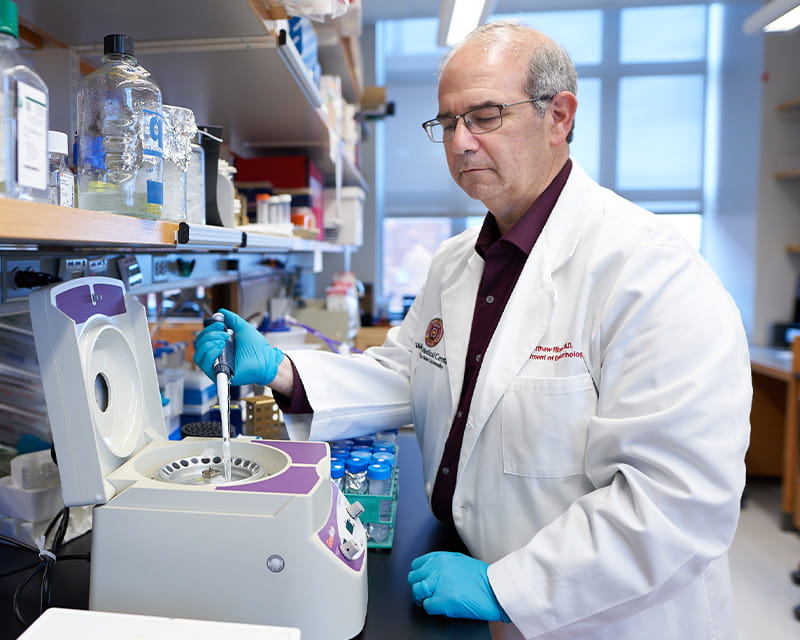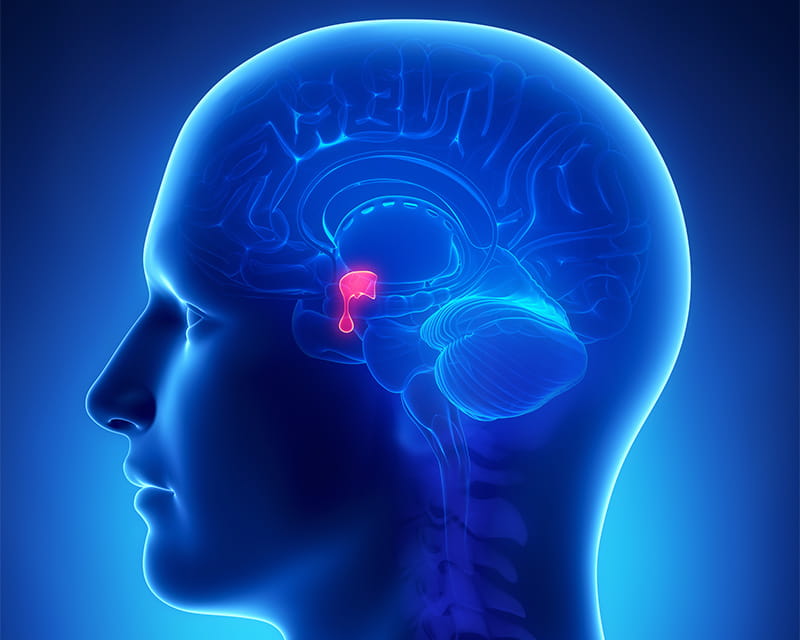
Studying “brake failure” in thyroid cancer metastasis
 Forward-thinking leaders at The Ohio State University have helped transform long-term outcomes and quality of life for people with rare and complex pituitary problems.
Forward-thinking leaders at The Ohio State University have helped transform long-term outcomes and quality of life for people with rare and complex pituitary problems.
Thanks in part to a multiyear effort that prioritized recruitment and research, the Pituitary Center — together with Ohio State’s renowned comprehensive skull-base surgery program — is now one of the largest programs of its kind in the United States, based on annual volume.
Clinicians at Ohio State manage the full range of functional and nonfunctional pituitary tumors, as well as hormonal disorders caused by these tumors. These include:
It takes a team of people to effectively treat conditions like these, says endocrinologist Luma Ghalib, MD, FACE, assistant professor in the Division of Endocrinology, Diabetes and Metabolism.
“The pituitary gland may be tiny, but it releases critical hormones and regulates several other important glands,” Dr. Ghalib, an assistant professor – clinical at the College of Medicine, says. “If it stops working properly, patients may experience profound problems with their overall health or development.”
To that end, multiple specialists contribute their expertise to each patient’s care plan. Team members may include neurosurgeons, otolaryngologists, endocrinologists, oncologists, ophthalmologists, radiologists or radiation oncologists.
“Because the pituitary gland has such a complex job and is surrounded by several important structures, surgical and medical therapies must be critically balanced,” Dr. Ghalib says. “Our goal is to provide the safest, most effective treatment possible while minimizing risk. Some disorders can be managed with medication, including lifelong hormone replacement therapy. But when surgery is the best option, patients can rest assured they’re in good hands.”
Ohio State’s pituitary program reached new heights during the last decade, when two internationally recognized pioneers in endoscopic skull-base surgery joined the team. Neurosurgeon Daniel Prevedello, MD, and otolaryngologist Ricardo Carrau, MD, a professor at the College of Medicine, helped develop and refine the minimally invasive techniques that allow surgeons to remove pituitary and other skull-base tumors through the nose — eliminating the need for craniotomies.
Another team member, Patrick Youssef, MD, is one of a handful of neurosurgeons in the nation dual-trained in open and endovascular neurosurgery.
“It’s no secret that more experience correlates with better outcomes,” Dr. Ghalib says. “Dr. Prevedello, who is a professor at the College of Medicine, is among the few neurosurgeons in the world who has performed more than 1,000 endoscopic endonasal surgeries. And Dr. Youssef, an assistant professor – clinical at the College of Medicine, is one of the only physicians trained to perform a procedure called inferior petrosal sinus sampling, or IPSS. This is an important diagnostic tool that helps us distinguish between different types of Cushing syndrome.”
Ohio State’s skull-base surgeons offer the entire breadth of surgical techniques, including:
Ohio State’s pituitary patients also benefit from access to clinical trials. The team’s actively recruiting and recently completed studies include:
“My colleagues and I continuously engage in clinical research to better understand pituitary disorders, help reduce the side effects of treatment or improve outcomes,” Dr. Ghalib says. “We’re always looking to enroll patients who are interested in trying emerging therapies, and welcome referrals for clinical trial recruitment. We also work closely with community physicians from around the country and are happy to provide second opinions or perioperative management as needed.”